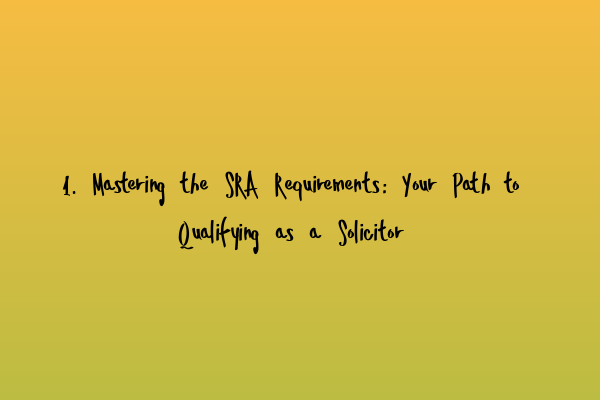Mastering the SRA Requirements: Your Path to Qualifying as a Solicitor
Are you aspiring to become a solicitor? The legal profession offers exciting opportunities to make a difference in people’s lives and contribute to the fair and just functioning of society. But before you can embark on this rewarding career path, you must navigate the regulatory requirements set by the Solicitors Regulation Authority (SRA). In this comprehensive guide, we will explore the SRA requirements and provide valuable insights to help you qualify as a solicitor.
The SRA, as the regulatory body for solicitors in England and Wales, plays a crucial role in maintaining the standards and integrity of the legal profession. Their requirements are designed to ensure that solicitors possess the necessary knowledge, skills, and ethical values to serve their clients and uphold the rule of law. Let’s delve into the essential steps you need to take to master the SRA requirements:
1. Education and Qualification:
Education forms the foundation of your legal career. To qualify as a solicitor, you must possess a qualifying law degree or an equivalent qualification. The SRA recognizes the various routes to qualification, including Graduate Diploma in Law (GDL) and Legal Practice Course (LPC). It is important to choose a reputable institution that meets the SRA’s standards to pursue your legal studies and ensure compliance with their academic requirements.
2. Trainee Contract:
One of the crucial requirements towards becoming a solicitor is completing a period of recognized training. This involves securing a training contract with an authorized training provider, such as a law firm or an in-house legal department. During this training period, you will gain practical experience, receive supervision, and work in different areas of law to develop the necessary skills and competencies expected of a solicitor.
3. Professional Skills Course (PSC):
To supplement your practical training, the SRA mandates completion of the Professional Skills Course (PSC). This course focuses on developing key competencies such as advocacy, client interviewing, legal research, and case analysis. The PSC ensures that aspiring solicitors are equipped with the skills required to deliver high-quality legal services.
4. Character and Suitability:
Integrity and ethical conduct are at the core of the legal profession. The SRA requires all applicants to demonstrate good character and suitability to become a solicitor. This involves undergoing a character and suitability assessment, where factors like criminal records, bankruptcy, and disciplinary proceedings are taken into consideration. It is essential to maintain a clean record and act in accordance with the SRA’s principles of ethical behavior.
5. SRA Training Record:
Throughout your training contract, it is imperative to maintain an accurate and detailed SRA Training Record. This record serves as evidence of the skills and competencies you have acquired during your training. It is recommended to keep track of your day-to-day activities, training sessions, and reflective practice to showcase your professional development.
6. Professional Ethics:
Ethical conduct is a cornerstone of the legal profession. The SRA places significant emphasis on maintaining the highest ethical standards. It is essential to familiarize yourself with the SRA’s Code of Conduct and adhere to its principles. Upholding client confidentiality, acting in the best interests of your clients, and avoiding conflicts of interest are key aspects of professional ethics that every solicitor must uphold.
7. Continuing Professional Development (CPD):
The legal profession is constantly evolving, and solicitors are required to stay up-to-date with legal developments and engage in continuous learning. The SRA expects solicitors to undertake continuing professional development (CPD) to enhance their knowledge and skills. This involves attending seminars, conferences, webinars, and workshops relevant to your practice area.
In conclusion, the SRA requirements are an integral part of the journey to becoming a solicitor. By mastering these requirements, you demonstrate your commitment to professionalism, ethical conduct, and delivering exceptional legal services. Taking the time to understand and fulfill the SRA’s expectations will pave the way for a successful and rewarding legal career. Remember, each step brings you closer to achieving your goal of qualifying as a solicitor and making a positive impact in the lives of your clients and society as a whole.
Contact SQE Exam Law for expert guidance and support on your journey to qualifying as a solicitor. Our experienced team of solicitors and legal professionals are here to help you navigate the SRA requirements and succeed in your legal career.
Disclaimer: This blog post is for informational purposes only and does not constitute legal advice. Consult with a qualified solicitor for personalized guidance regarding your specific circumstances.

Leave a Reply